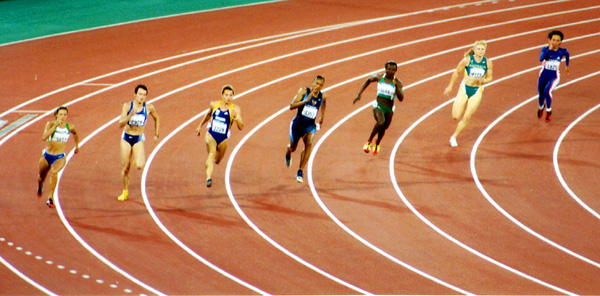Time of day affects athletic performance
Interview with
Athletes competing at the wrong time of day could be missing their best by up to 26%, according to a new study. By comparing the sporting performances of "owl" athletes with more "lark"-like early risers, Birmingham scientist Roland Brandstaetter has shown that correctly syncing your race time with your body clock can make the difference between a gold medal and not even qualifying, as he explained to Chris Smith...
to 26%, according to a new study. By comparing the sporting performances of "owl" athletes with more "lark"-like early risers, Birmingham scientist Roland Brandstaetter has shown that correctly syncing your race time with your body clock can make the difference between a gold medal and not even qualifying, as he explained to Chris Smith...
Roland - What we have found is that the performance of individual athletes is different between what we call human owls and human larks. That means people with different types of body clocks. Early risers, the ones that we call larks, who get up early in the morning and want to go to bed early, have their performance maximum around midday while those that wake up late and go to bed very late, so-called 'owls,' have their performance maximum in the evening, at around 8 o'clock. What we also found is that performance difference of an athlete between their morning performance and their evening performance can be as pronounced as 26%, which is huge in the sports world.
Chris - Yes, and indeed, that's going to make the difference between whether someone even qualifies to compete in the 100 metres compared with winning the 100 metres, isn't it? I mean, it's a massive difference.
Roland - Absolutely. I mean, if you look at the London Olympics in the 100-metre men's race, the time difference between the gold medal and the last one in the race was only 5%.
Chris - How did you arrive at this conclusion? What did you actually do to discover this?
Roland - What we did is, we looked at a certain number of competition level athletes and let them complete the questionnaire that asks for many different parameters related to their sleep-wake rhythms, training schedules, eating habits, etc. And then we classified these individuals into the larks, intermediate ones and owls. Then we selected athletes from this pool and conducted BLEEP test system. That's a standard fitness and performance test at 6 different times of day with them and found that they are significantly different between owls and larks.
Chris - Why do you think you see this very dramatic difference between these different types of people and how they perform at different times of the day? How do you account for this?
Roland - The reason why we see these differences is, because these individuals have different body clocks. The early types, the larks, have faster running body clocks and you have to bear in mind that the body clock controls more or less, all of our physiology, everything. For an athlete, this is particularly important because things like how sugar is utilised by the muscles, how alert a person is, and of course, how physically active we can be depends very much on the state of wakefulness. So, if you are fully awake because your biologic clock lets you then you can achieve your personal best performance.
Chris - Can you see a time then when athletes are going to be profiled and people are going to say, "Well, let's do a test on you. We'll see whether you're an early type or a late type" and then people may be selected or dropped for games, matches and so on, based on what sort of body clock type they've got, and when the match is going to be played?
Roland - I think it might become a very important aspect in the future. What you have to bear in mind is the different sports have their different times of day. So, very often, you see marathons take place in the morning. But then we look at football, that mostly takes place in the afternoon and the evening. And of course, football is a very good example actually because a lot of the premier league games happen in the after, while if you play champion's league, you have to be at your personal best performance in the evening. So, what I can imagine is that by profiling individuals and knowing about their body clocks, athletes and coaches can have a huge advantage. We do not think in terms of individuals being dropped. People can actually work on optimising their performance. But of course, if you look at it from the point of view of a coach, if you are football coach in the premier league and you have equally skilled players that are early types and late types, you can choose maybe more of the early types for an afternoon match but more of the late types for an evening match. Again, it would have a huge advantage.
Chris - So, what type are you, Roland? Do you write your best papers and do your best research in the morning, or does it come to you late at night?
Roland - I'm an intermediate type. But since I know very well how my body clock works and since I know exactly how to speak to my body clock, I can very easily in-train myself, shift myself to become an owl or to become a lark, depending on what the requirements are.
- Previous What is the microbiome?
- Next Punishments don't deter psychopaths









Comments
Add a comment